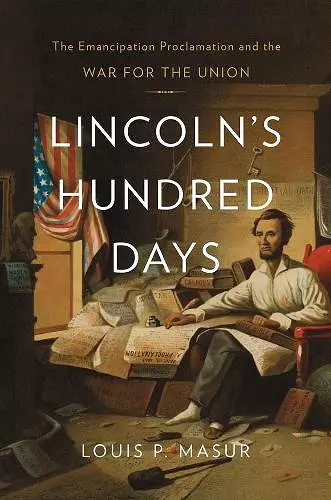Lincoln’s Hundred Days
The Emancipation Proclamation and the War for the Union
Format:Paperback
Publisher:Harvard University Press
Published:12th May '14
Currently unavailable, and unfortunately no date known when it will be back

"The time has come now," Abraham Lincoln told his cabinet as he presented the preliminary draft of a "Proclamation of Emancipation." Lincoln's effort to end slavery has been controversial from its inception-when it was denounced by some as an unconstitutional usurpation and by others as an inadequate half-measure-up to the present, as historians have discounted its import and impact. At the sesquicentennial of the Emancipation Proclamation, Louis Masur seeks to restore the document's reputation by exploring its evolution.
Lincoln's Hundred Days is the first book to tell the full story of the critical period between September 22, 1862, when Lincoln issued his preliminary Proclamation, and January 1, 1863, when he signed the final, significantly altered, decree. In those tumultuous hundred days, as battlefield deaths mounted, debate raged. Masur commands vast primary sources to portray the daily struggles and enormous consequences of the president's efforts as Lincoln led a nation through war and toward emancipation. With his deadline looming, Lincoln hesitated and calculated, frustrating friends and foes alike, as he reckoned with the anxieties and expectations of millions. We hear these concerns, from poets, cabinet members and foreign officials, from enlisted men on the front and free blacks as well as slaves.
Masur presents a fresh portrait of Lincoln as a complex figure who worried about, listened to, debated, prayed for, and even joked with his country, and then followed his conviction in directing America toward a terrifying and thrilling unknown.
When Lincoln published a preliminary proclamation on September 22, 1862, warning Confederate states of his intention to issue a final edict on January 1, he did not realize that those two dates stood precisely one hundred days apart. Louis Masur’s Lincoln’s Hundred Days focuses on that crucial period, but it starts more than a year earlier to set the stage for those hundred days, and follows up with the aftermath and consequences of Lincoln’s historic action. Masur…argue[s] persuasively that the progression of events during that critical autumn of the war were full of contingencies and that the final outcome was by no means certain… Provide[s] detailed and careful renderings of these events and of Lincoln’s intellectual journey. -- James M. McPherson * New York Review of Books *
Among the strengths of Masur’s book is its account of how the war changed minds—from enlisted and conscripted men to those directing the war—by introducing ‘slavery to soldiers as a reality, not as an abstraction.’ -- Andrew Delbanco * New Republic *
[A] splendid book. -- Ed Voves * California Literary Review *
A moving, accessible portrayal of Lincoln as a deeply humble, strangely physical presence who spoke in oracular parables. * Kirkus Reviews *
A lucid and learned account of the process whereby Lincoln moved toward emancipation, and once so committed, made it the lodestar of the Union… Masur makes much of the importance blacks attributed to the document as their Declaration of Independence and the importance of black soldiers in giving it force… This is now the best work on the proclamation. As its sesquicentennial looms (January 2013), all persons wanting to understand the contingency of freedom should read this book. -- Randall M. Miller * Library Journal (starred review) *
Masur delivers an intelligent account of how Lincoln balanced politics with the goal of ending slavery… Readers will enjoy his rich, perceptive history of the passionate maneuvering that produced it. * Publishers Weekly *
Masur takes a pivotal moment in time and opens it up like a master watchmaker, revealing the intricate, hidden mechanisms, the tensions and balances, concealed within the most momentous decision that an American president has ever made. A finely wrought and important book. -- Adam Goodheart, author of 1861: The Civil War Awakening
Masur has written a compelling, convincing page-turner about a dramatic period in history that too many Americans take for granted—the fraught hundred days between Lincoln’s preliminary and final proclamations of freedom, when the fate of liberty itself hung in the balance. Here is superb scholarship and high drama combined into a rich and rewarding narrative. -- Harold Holzer, author of Emancipating Lincoln
A stirring and penetrating account of those tense days between Lincoln’s preliminary edict and the final Emancipation Proclamation. The story will keep the reader on the edge of his seat until the final pages. -- James M. McPherson, author of Battle Cry of Freedom
A vital book about the meaning of the Civil War, and of America, brilliantly conceptualized, deeply researched, and elegantly written by one of the foremost scholars of the Civil War era. With fresh insights throughout, coupled with subtle and judicious syntheses, it should be read by anyone interested in America’s past. -- John Stauffer, author of Giants: The Parallel Lives of Frederick Douglass and Abraham Lincoln
- Nominated for Francis Parkman Prize 2013
- Nominated for Tom Watson Brown Book Award 2013
- Nominated for Avery O. Craven Award 2013
- Nominated for Pulitzer Prizes 2013
- Nominated for Henry Adams Prize 2013
ISBN: 9780674284098
Dimensions: unknown
Weight: unknown
384 pages